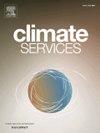Standardisation of equitable climate services by supporting a community of practice
IF 4.5
3区 环境科学与生态学
Q2 ENVIRONMENTAL SCIENCES
引用次数: 0
Abstract
Climate services are essential to support climate-sensitive decision making, enabling adaptation to climate change and variability, and mitigate the sources of anthropogenic climate change, while taking into account the values and contexts of those involved. The unregulated nature of climate services can lead to low market performance and lack of quality assurance. Best practices, guidance, and standards serve as a form of governance, ensuring quality, legitimacy, and relevance of climate services. The Climateurope2 project (www.climateurope2.eu) addresses this gap by engaging and supporting an equitable and diverse community of climate services to provide recommendations for their standardisation. Four components of climate services are identified (the decision context, the ecosystem of actors and co-production processes, the multiple knowledge systems involved, and the delivery and evaluation of these services) to facilitate analysis. This has resulted in the identification of nine key messages summarising the susceptibility for the climate services standardisation. The recommendations are shared with relevant standardisation bodies and actors as well as with climate services stakeholders and providers.
通过支持实践社区实现公平气候服务的标准化
气候服务对于支持对气候敏感的决策、适应气候变化和可变性、减缓人为气候变化的来源至关重要,同时要考虑到相关人员的价值观和背景。气候服务的非规范性可能导致市场绩效低下和缺乏质量保证。最佳实践、指导和标准可作为一种治理形式,确保气候服务的质量、合法性和相关性。Climateurope2 项目 (www.climateurope2.eu) 通过参与和支持公平、多样化的气候服务社区,为其标准化提供建议,从而弥补了这一不足。该项目确定了气候服务的四个组成部分(决策环境、参与者和共同生产过程的生态系统、所涉及的多种知识系统以及这些服务的提供和评估),以促进分析工作。最终确定了九条关键信息,总结了气候服务标准化的易感性。这些建议将与相关标准化机构和参与者以及气候服务利益相关者和提供者分享。
本文章由计算机程序翻译,如有差异,请以英文原文为准。
求助全文
约1分钟内获得全文
求助全文
来源期刊

Climate Services
Multiple-
CiteScore
5.30
自引率
15.60%
发文量
62
期刊介绍:
The journal Climate Services publishes research with a focus on science-based and user-specific climate information underpinning climate services, ultimately to assist society to adapt to climate change. Climate Services brings science and practice closer together. The journal addresses both researchers in the field of climate service research, and stakeholders and practitioners interested in or already applying climate services. It serves as a means of communication, dialogue and exchange between researchers and stakeholders. Climate services pioneers novel research areas that directly refer to how climate information can be applied in methodologies and tools for adaptation to climate change. It publishes best practice examples, case studies as well as theories, methods and data analysis with a clear connection to climate services. The focus of the published work is often multi-disciplinary, case-specific, tailored to specific sectors and strongly application-oriented. To offer a suitable outlet for such studies, Climate Services journal introduced a new section in the research article type. The research article contains a classical scientific part as well as a section with easily understandable practical implications for policy makers and practitioners. The journal''s focus is on the use and usability of climate information for adaptation purposes underpinning climate services.
 求助内容:
求助内容: 应助结果提醒方式:
应助结果提醒方式:


